By: debbie lynn elias
With DELIVER US FROM EVIL, one thing is certain – no one should ever deliver us from the genius that is director Scott Derrickson. As he did with “Sinister”, Derrickson again not only dives headfirst into a world of demonology, rooted in centuries of faith, fact, fiction, but blends it with true stories inspired by NYPD Sgt. Ralph Sarchie’s crime laden world of the Bronx’s 46th Precinct. Sarchie, a 26-year veteran of NYPD with over 300 arrests and 7 commendations to his credit, while on the force began investigating “true crimes of inhuman evil” which revealed themselves to be cases of demonic possession, leading Sarchie to study and assist in exorcisms. It is through his 2001 book “Beware the Night” that Sarchie related the horrors of hell on earth linking true crime and supernatural demonic terror. It is this book that piqued the curiosity of producer Jerry Bruckheimer who then brought in Scott Derrickson to bring Sarchie’s story to the big screen.
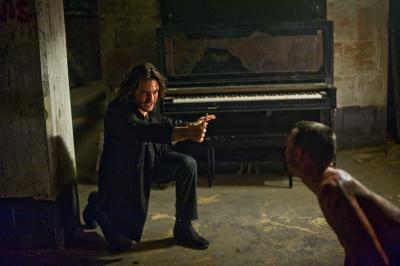
Derrickson has a gift, and never moreso than with DELIVER US FROM EVIL over his other films, of not only immersing us within the world of what most consider intangible primary evil, but imbues every fiber of our being with the experience. It’s as if the people, the events, the evil on screen is searing our minds, etching our skin. Powerful is an understatement. DELIVER US FROM EVIL is a fully sensory and terrifying experience capped off with a spellbinding performance by Edgar Ramirez.
Inspired by Sarchie’s book, DELIVER US FROM EVIL takes those real life experiences and Sarchie’s work with a Catholic bishop who performed exorcisms and who taught Sarchie to be an assistant in the rite of exorcism, melding the horrifically true events with a fictional narrative structured from real individuals and situations. While Sarchie is very real, his religious counterpart in the film, Father Mendoza, is an amalgamation of both the exorcizing bishop and a Catholic priest known for his books on demonology and exorcism.
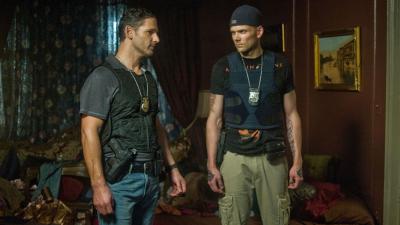
Ralph Sarchie and his partner Butler are as different as night and day but a perfect pairing on the crime beat of the 46th Precinct. Although kidded by Butler about his “internal radar”, both are proud of Sarchie’s gift for sensing what will be the more high profile and intriguing crime as opposed to the run-of-the-mill mugging. What starts as a seemingly simple call for domestic violence, leads Sarchie to suspect more is at play when he comes face-to-face with the wife-beating husband. The eyes, the strength, the violence. Is it drugs? Is it the heat?
A family calls for help with sounds of an intruder in the basement, and not just sounds, but strange occurrences within the house that coincide with the noises; bulbs continually blow out, candles won’t stay lit. It’s as if a “presence” has taken over the house. A permeating stench in the basement yields a dead body.
And then there’s the mother who throws her son into the lion’s den at the Bronx Zoo while a hooded figure seemingly stands guard, as if pleased to see the horror unfurl. For Sarchie, he again wonders, is it drugs, insanity, the heat? But what is more interesting to Sarchie is the hooded figure who has spent the day painting a wall in the lion’s den. As Sarchie goes to investigate, he sees archaic Latin written on the wall that the man was painting over. He also finds himself alone in the lion’s den when the hooded figure releases the lions, obviously with Sarchie as their intended late night snack.
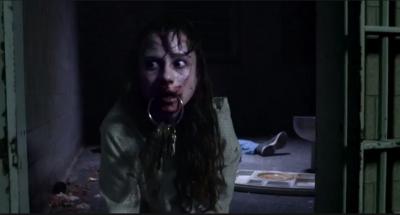
Safely back at the precinct after the zoo incident, Sarchie is met by Father Joe Mendoza. A Jesuit priest who knows the woman, Jane, and who has been working with her, Mendoza tells Sarchie there are darker forces at work than drugs or mental illness. “There are two types of evil, Officer Sarchie. Secondary evil, the evil that men do. And primary evil, which is something else entirely.”
As events begin hitting close to home and as Sarchie become more irritable and more withdrawn from his wife and daughter, he starts to open his mind to Father Mendoza’s words. Common threads appear. Three U.S. Marines who survived war in Iraq but who came home disgraced and changed are all involved in the strange happenings. And then two of turn up dead while the third even has the knife wielding ex-Army Ranger Butler fighting for his life, while the crazy woman Jane, gets even crazier when Mendoza and Sarchie go to meet with her. “Invocamus Je Vi Ingredia Ab Inferis”. Is Mendoza right? Is this the work of demons, the Devil? And if so, can they defeat it and how?
As Sarchie and Mendoza, respectively, Eric Bana and Edgar Ramirez just rock my world with their performances. Bana as Sarchie, a product of Catholic schools and now lapsing practicing Catholic, and Ramirez as Mendoza, a Jesuit priest who has fought his own earthly demons over his lifetime and struggles with them to this day, are so authentic, so raw, so intense, so true to the story and the people whom they portray (although Ramirez’ Montoya is a blend of two men), it’s mind-boggling to comprehend how they each put so much energy and conviction into the roles so as to come out on the other side of shooting unscathed, particularly Ramirez; of course as Ramirez says, “You never come out unscathed. There’s always a mark but that’s what you want.” During the film’s explosively climatic scene, Ramirez had me frozen. I still don’t think I ever blinked or took a breath. Having just seen Ramirez in “The Liberator” and interviewed him briefly for that just two days before seeing DELIVER US FROM EVIL, my mind reels at his range of intensity and power.
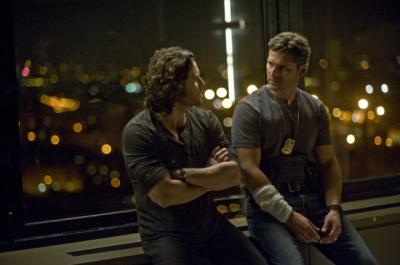
As described by Ramirez, “These are heavy subjects. . .I don’t treat these things lightly. I’ve always felt very respectful towards this type of phenomena. I’ve never treated them in a cynical way or with distance or with sarcasm. I cannot deny something that I don’t fully understand so I cannot make fun of something that I don’t understand just because I don’t fully get it. That’s why I’ve always treated this with a lot of respect. I walked into this movie with an open mind and I left with an even broader mind and greater respect for this.” Given the heavy emotional lifting of Ramirez in DELIVER US FROM EVIL and the intensity of father Mendoza, Ramirez armed himself well with preparation speaking with exorcists and priests. “The important thing was to understand the reasons why these guys would devote themselves to help people in that way or to help people in those conditions or in that condition. That for me was the focus. . . I wanted to get specific in understanding the motivations of this character [Mendoza], of his struggles, his challenges. . .There was something that was explained to me that I found was very revealing – it was the contradiction between the divine and the profane, between divinity and profanity, that priests have to deal with constantly. There’s a pull and push because the same hands that would perform sacraments, that would baptize a kid, are the same hands that would take this mug and smash it against the wall in fury or in anger. You’re there as a representative of God and you are an instrument but at the same time, this instrument is not up in the air, it’s on the ground, it’s on earth so it gets the mud and the mundane aspect of reality as human beings. . .There’s a tension there and that tension I found both disturbing and also fascinating. . .[t]hey are very specific things and struggles that this guy has to deal with every day in trying to keep on the right path every day. That was very moving for me.”
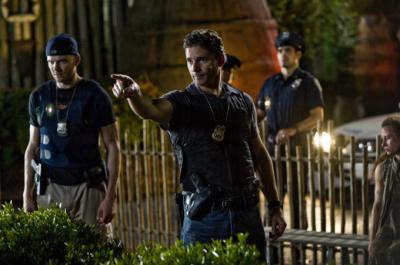
Joel McHale stuns. Never would I ever have imagined him in a role as dynamic and physical as that of Butler. But, thanks to McHale, Butler’ sardonic wit gives us the much needed moments of respite, time to breathe, with some levity – something which is so present within first responders. Again, authenticity. But then you add the practical physical stunt work and knife work which McHale does himself, all leading up to a stairwell knife fight between McHale and Sean Harris that is nothing short of intense and amazing. You gotta go “Wow”!
Frighteningly terrifying and horrific are the performances of Sean Harris as the possessed Santino and Olivia Horton as a demonic disciple Jane who will have you reaching for the Holy Water and rosary beads while chanting the Lord’s Prayer.
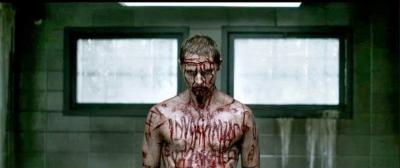
Having read Sarchie’s book on its first release, I am beyond impressed with how Derrickson and co-writer Paul Boardman, pick and choose the elements to weave into the fabric of DELIVER US FROM EVIL. While the book creates its own indelible imagery and emotion, Derrickson and Boardman distill it all into something that is more frenetic and frenzied and palpable than can be achieved by turning the pages. I immediately noticed a blending of events and individuals from real life into amalgamations on the screen; e.g., in the book, a young girl is possessed and violated by a demon, a home is possessed (albeit by the spirit of a 19th century bride who was murdered, a couple are the epitome and embodiment of the term “living hell” while a painter desperately tries to self-exorcize the demon within him. With this richness from which to choose, Derrickson brings all into the story and film mixing and matching to create an interlocking story with the connective tissue being the character of Santino. Brilliant adaptation.
Describing it as “quite a screenwriting trick”, Derrickson found some of the stories in the book “harrowing”. Starting with those, he then had the chance to see some of the actual materials and interview tapes. For example, the Albergetti family. “I was so moved by who they were emotionally. It was a matter of knowing that these certain things would make great scenes in the movie. I knew Ralph [Sarchie] and had gotten a deep sense of the value of who he was as a film character, as a real cop, as an undercover Bronx hard core guy, foul-mouthed Italian that he is. And yet, how do you do that in a movie? So taking one small element and coming up with a fictional narrative that tied them all together was the great trick but I think we did it. Once it started to work that was the point where I knew I would make it.”
Going a step further, Derrickson and Boardman meticulously include the elements of Sarchie’s trade and that of the real life priests and exorcists – holy water, blessed salt, prayer, a St. Benedict medal. Avoiding “exorcist tropes” as we have seen so many times before, everything that unfolds on screen and everything we witness feels real, feels true. (Sorry Linda Blair and William Friedkin, but spinning heads and green projectile vomit just don’t pass muster.) Also notable are the inclusion of little things that have been strongly documented by the church and others over the years, like demonic events and appearances occurring during the middle of the night, generally around 3am, as a mockery to God and Christ, who died on the cross at 3pm.
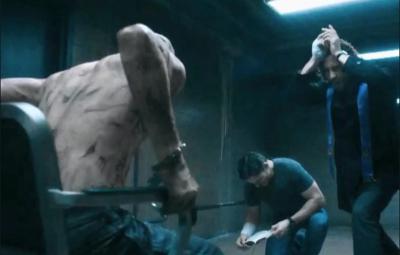
One of the driving forces of DELIVER US FROM EVIL is Derrickson’s play on the unseen, preying on the inherent fear of people when invoking demons – just as is outlined in the “Compendium of Ecclesiastal History” – and as Sarchie attests in his book; stuffed animals, weather, lights, windows, toys, clairvoyance, rocking lamps. From a visual standpoint, Derrickson gives us plausible explanation for all – a mouse rocked the lamp, a hose that in dim light looks like a snake is merely a hose, radios just have bad connections, batteries wearing out on mag lights, floor noises could be mice, basement smells could be the garlic, peppers and herbs drying on the pipes. But then thanks to the mad skills of cinematographer Scott Kevan and editor Jason Hellman, the events intensify both visually and in pacing with psycho people looking like they are beyond drugged out. One of the ex-Marines, Griggs, is taken to full color flesh and blood colored head popping in and out with fish-eye close-ups in black and white footage, flesh and blood tones become more prominent against the inky blue black night, the ebony wooded floors, even the footsteps of Bana and McHale as Sarchie and Butler, speed up, and land harder not as tip-toe as early in the film. Derrickson plays on what we as people fear the most – the dark, the unknown, the unspoken. Visually, he and Kevan then make the most of the tools in the cinema toolbox and bring negative space and shadowed darkness to life. Masterful design and construct.
Hand-to-hand fight sequences throughout the film are fueled by Scott Kevan’s lensing and the ever-present handheld visuals – travelling, tracking, close-ups. Kevan was everywhere and put us in the midst of it all. At times we were feeling Sarchie’s POV and other times, we were in the thick of the battles each was engaged.
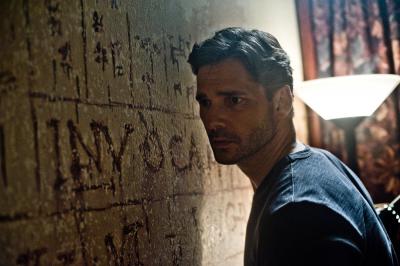
Shot on location throughout the Bronx during the hottest and wettest summer in history, Bob Shaw’s production design soars. From the narrow labyrinth of the early 1900’s hallways to passaged basements, creating angles and spaces where evil may lurk both in the corporeal and non-corporeal forms to caked layers of oil base paint covering walls, subconsciously steeps us in the idea of “what evil lurks” within the walls, within the history, within the former inhabitants, while drenched in hot torrential rains against the black of night. The visual and emotional tonal bandwidths are completely synergistic, feeding off one another the way evil fears on the weak and on fear.
Sound design is key here, particularly when blended with the VFX during the climactic exorcism scene with Ramirez, Bana and Harris. Finding a balance between hurricane-force winds, shrill otherworldly shrieks and screams, blocks of exploding glass and the invocations of the exorcism rite by Ramirez, there is not a sound nor word sacrificed.
Completing the experience is Christopher Young’s scoring mixed with metaphorically significant tracks from The Doors. Great metaphoric insight by Derrickson in weaving Jim Morrison and “The Doors” into the script and film’s structure as a whole.
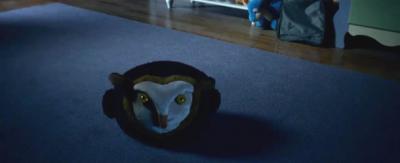
DELIVER US FROM EVIL does indeed possess you, invoking the terror of a force entered from below (Invocamus Je Vi Ingredia Ab Inferis). As the ecclesiastic teachings of the centuries show us, whenever true evil has appeared and has been vanquished, something positive and light is then created or left in the world. DELIVER US FROM EVIL is a cacophony of evil that has led to excellence.
Directed by Scott Derrickson
Written by Scott Derrickson and Paul Harris Boardman based upon the book “Beware the Night” by Ralph Sarchie and Lisa Collier Cool.
Cast: Eric Bana, Edgar Ramirez, Joel McHale, Olivia Munn, Sean Harris, Olivia Horton, Chris Coy, Scott Johnsen












